Company Law Case Study: Directors' Liabilities, Duties & ASIC Remedies
VerifiedAdded on 2023/06/04
|12
|2588
|497
Case Study
AI Summary
This case study analyzes a scenario involving potential breaches of directors' duties under the Corporations Act 2001 (Cth), specifically focusing on insolvent trading. It examines whether a liquidator can recover unpaid amounts from shadow directors (Bill and Sue) and what legal remedies the Australian Securities and Investments Commission (ASIC) might pursue against them. The analysis applies relevant sections of the Act, including Section 9 (definition of director) and Section 588G (directors' duty to prevent insolvent trading), along with case law like Salomon v A Salomon. The study concludes that the liquidator is likely to succeed in recovering the debts, and ASIC has several potential legal remedies, including pecuniary penalties, compensation orders, and disqualification from managing corporations, especially considering the doctrine of lifting the corporate veil.
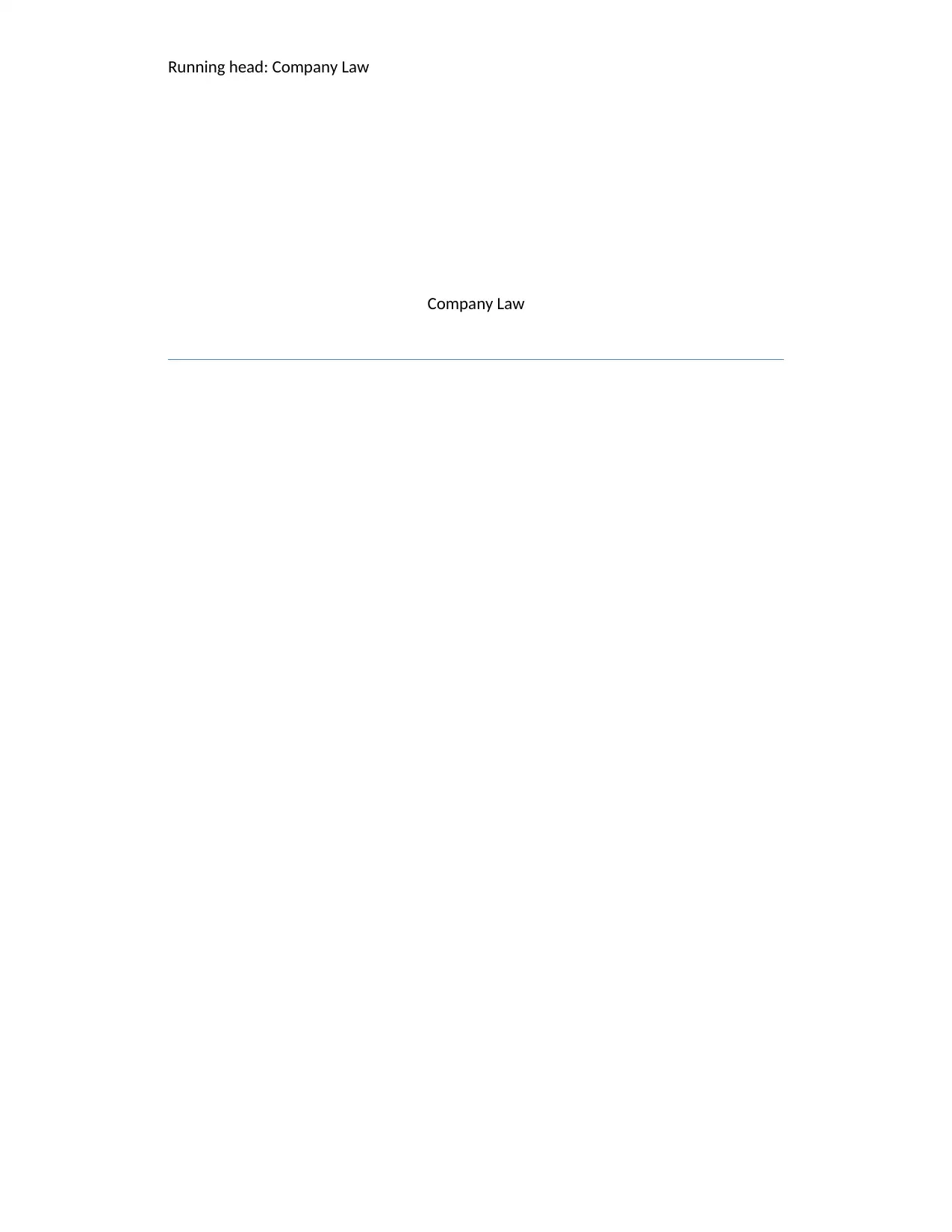
Running head: Company Law
Company Law
Company Law
Paraphrase This Document
Need a fresh take? Get an instant paraphrase of this document with our AI Paraphraser
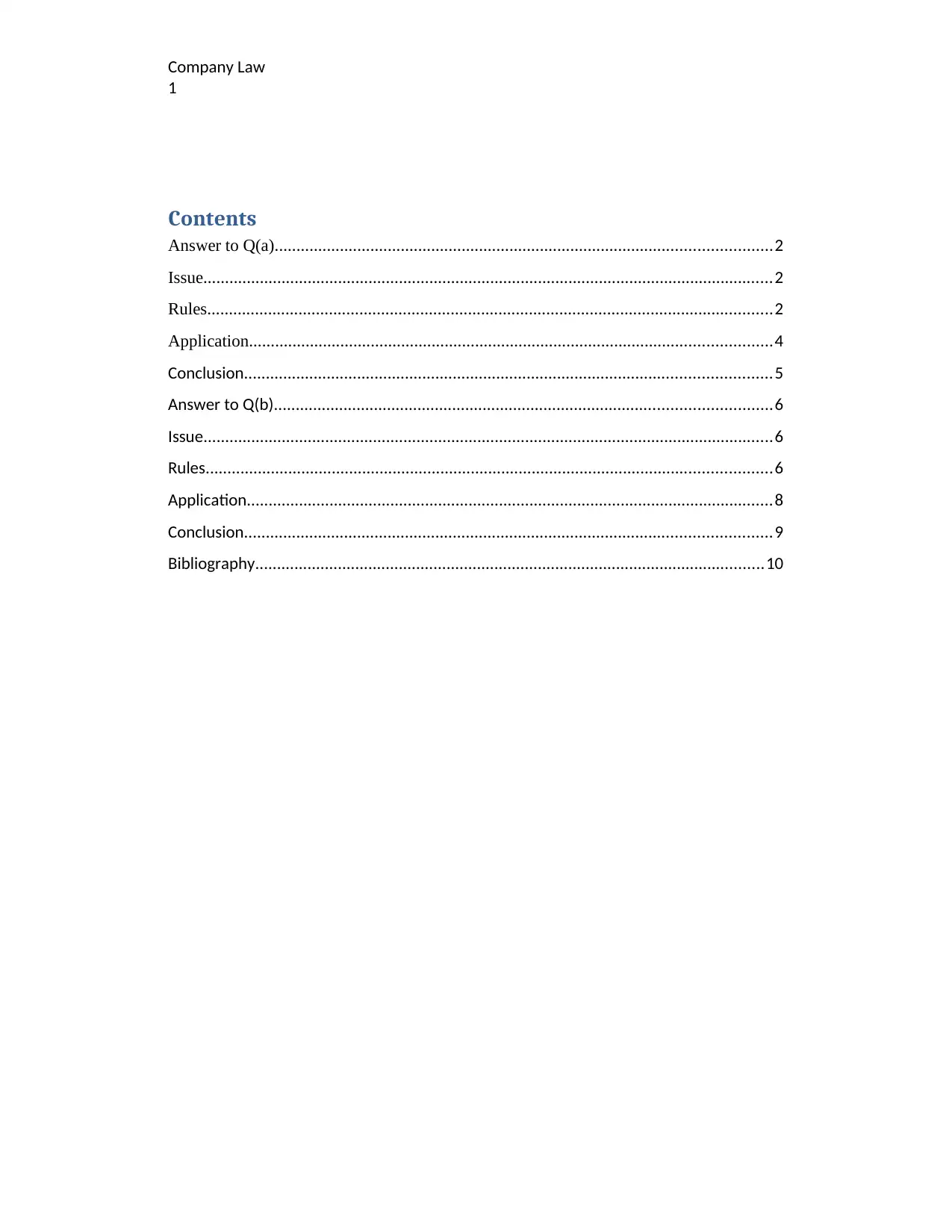
Company Law
1
Contents
Answer to Q(a)..................................................................................................................2
Issue...................................................................................................................................2
Rules..................................................................................................................................2
Application........................................................................................................................4
Conclusion.........................................................................................................................5
Answer to Q(b)..................................................................................................................6
Issue...................................................................................................................................6
Rules..................................................................................................................................6
Application.........................................................................................................................8
Conclusion.........................................................................................................................9
Bibliography.....................................................................................................................10
1
Contents
Answer to Q(a)..................................................................................................................2
Issue...................................................................................................................................2
Rules..................................................................................................................................2
Application........................................................................................................................4
Conclusion.........................................................................................................................5
Answer to Q(b)..................................................................................................................6
Issue...................................................................................................................................6
Rules..................................................................................................................................6
Application.........................................................................................................................8
Conclusion.........................................................................................................................9
Bibliography.....................................................................................................................10
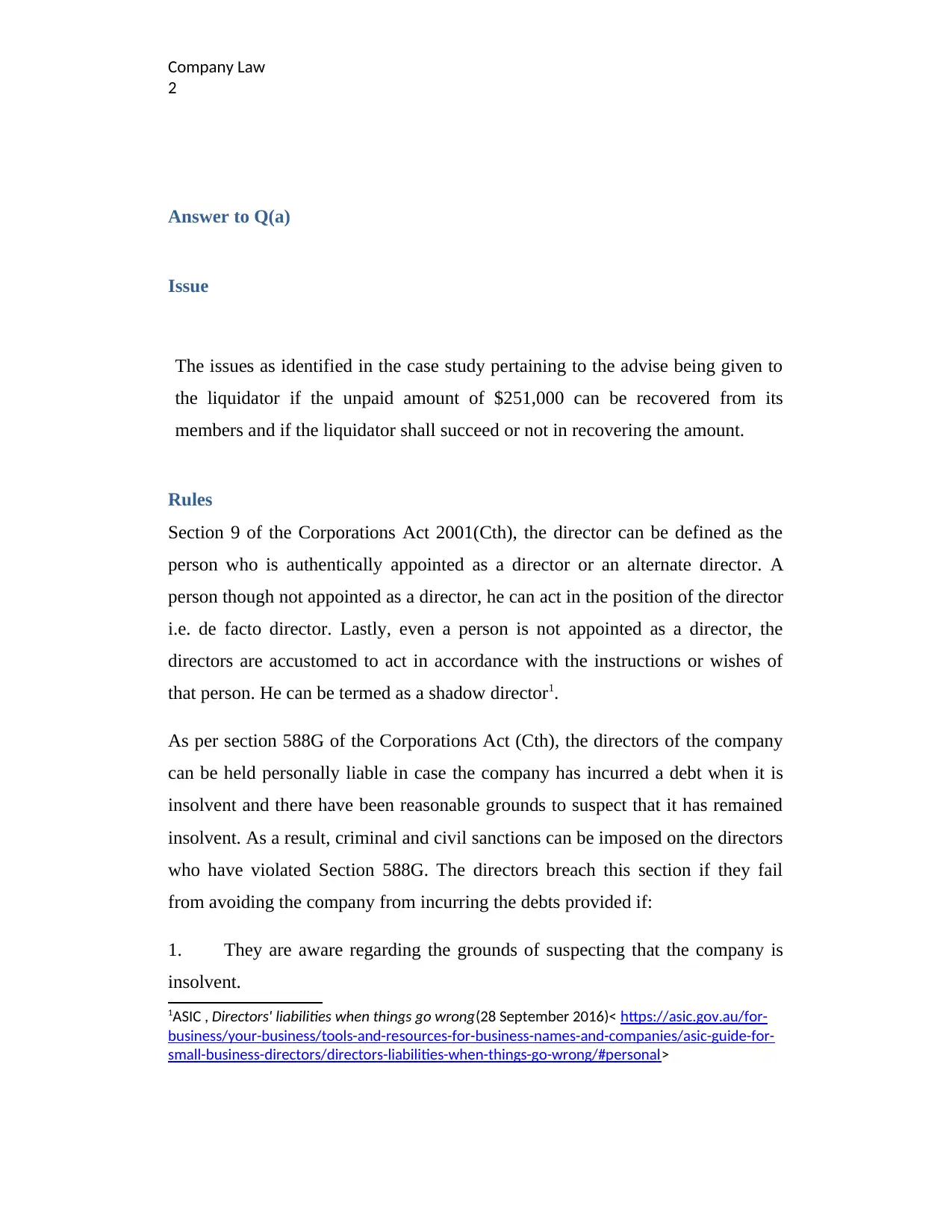
Company Law
2
Answer to Q(a)
Issue
The issues as identified in the case study pertaining to the advise being given to
the liquidator if the unpaid amount of $251,000 can be recovered from its
members and if the liquidator shall succeed or not in recovering the amount.
Rules
Section 9 of the Corporations Act 2001(Cth), the director can be defined as the
person who is authentically appointed as a director or an alternate director. A
person though not appointed as a director, he can act in the position of the director
i.e. de facto director. Lastly, even a person is not appointed as a director, the
directors are accustomed to act in accordance with the instructions or wishes of
that person. He can be termed as a shadow director1.
As per section 588G of the Corporations Act (Cth), the directors of the company
can be held personally liable in case the company has incurred a debt when it is
insolvent and there have been reasonable grounds to suspect that it has remained
insolvent. As a result, criminal and civil sanctions can be imposed on the directors
who have violated Section 588G. The directors breach this section if they fail
from avoiding the company from incurring the debts provided if:
1. They are aware regarding the grounds of suspecting that the company is
insolvent.
1ASIC , Directors' liabilities when things go wrong(28 September 2016)< https://asic.gov.au/for-
business/your-business/tools-and-resources-for-business-names-and-companies/asic-guide-for-
small-business-directors/directors-liabilities-when-things-go-wrong/#personal>
2
Answer to Q(a)
Issue
The issues as identified in the case study pertaining to the advise being given to
the liquidator if the unpaid amount of $251,000 can be recovered from its
members and if the liquidator shall succeed or not in recovering the amount.
Rules
Section 9 of the Corporations Act 2001(Cth), the director can be defined as the
person who is authentically appointed as a director or an alternate director. A
person though not appointed as a director, he can act in the position of the director
i.e. de facto director. Lastly, even a person is not appointed as a director, the
directors are accustomed to act in accordance with the instructions or wishes of
that person. He can be termed as a shadow director1.
As per section 588G of the Corporations Act (Cth), the directors of the company
can be held personally liable in case the company has incurred a debt when it is
insolvent and there have been reasonable grounds to suspect that it has remained
insolvent. As a result, criminal and civil sanctions can be imposed on the directors
who have violated Section 588G. The directors breach this section if they fail
from avoiding the company from incurring the debts provided if:
1. They are aware regarding the grounds of suspecting that the company is
insolvent.
1ASIC , Directors' liabilities when things go wrong(28 September 2016)< https://asic.gov.au/for-
business/your-business/tools-and-resources-for-business-names-and-companies/asic-guide-for-
small-business-directors/directors-liabilities-when-things-go-wrong/#personal>
⊘ This is a preview!⊘
Do you want full access?
Subscribe today to unlock all pages.

Trusted by 1+ million students worldwide
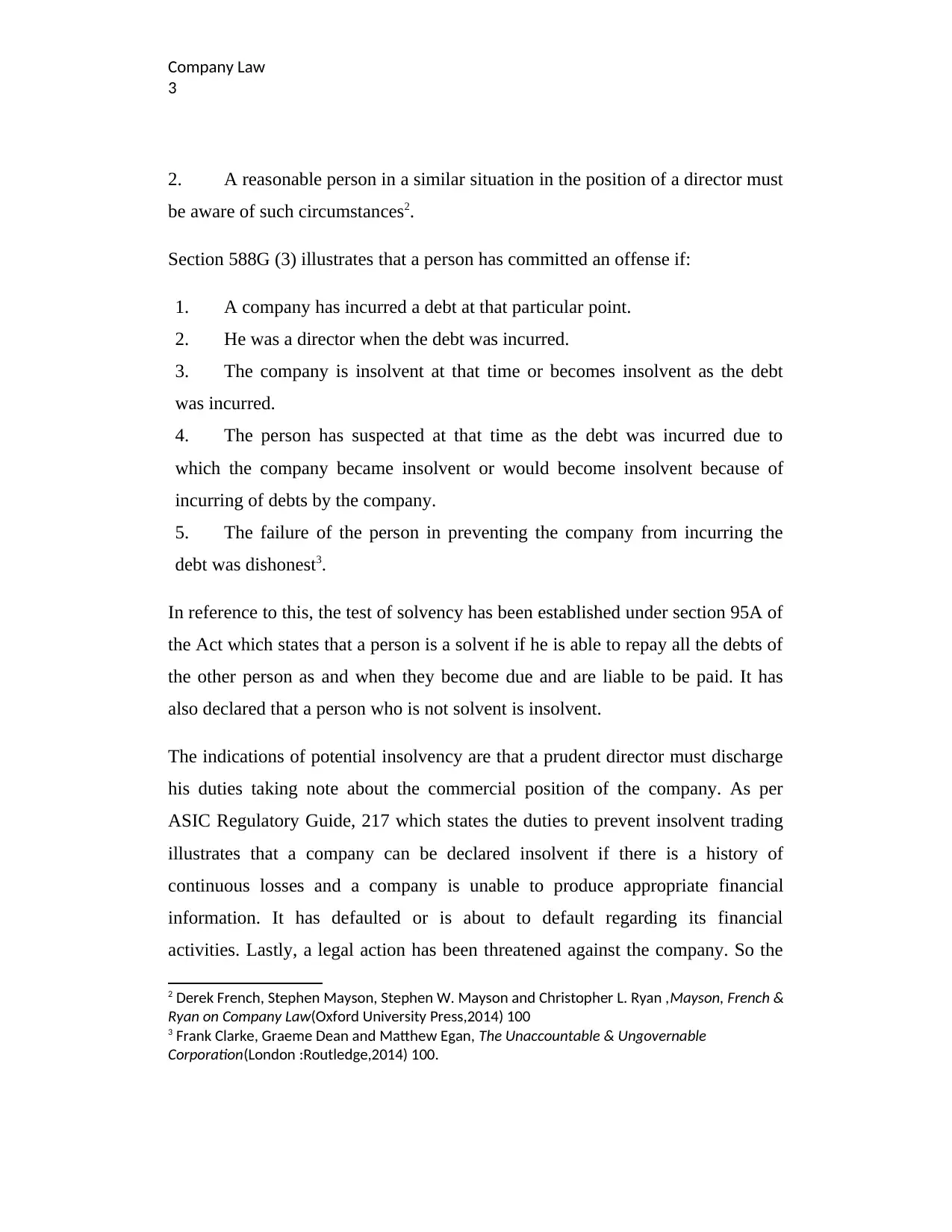
Company Law
3
2. A reasonable person in a similar situation in the position of a director must
be aware of such circumstances2.
Section 588G (3) illustrates that a person has committed an offense if:
1. A company has incurred a debt at that particular point.
2. He was a director when the debt was incurred.
3. The company is insolvent at that time or becomes insolvent as the debt
was incurred.
4. The person has suspected at that time as the debt was incurred due to
which the company became insolvent or would become insolvent because of
incurring of debts by the company.
5. The failure of the person in preventing the company from incurring the
debt was dishonest3.
In reference to this, the test of solvency has been established under section 95A of
the Act which states that a person is a solvent if he is able to repay all the debts of
the other person as and when they become due and are liable to be paid. It has
also declared that a person who is not solvent is insolvent.
The indications of potential insolvency are that a prudent director must discharge
his duties taking note about the commercial position of the company. As per
ASIC Regulatory Guide, 217 which states the duties to prevent insolvent trading
illustrates that a company can be declared insolvent if there is a history of
continuous losses and a company is unable to produce appropriate financial
information. It has defaulted or is about to default regarding its financial
activities. Lastly, a legal action has been threatened against the company. So the
2 Derek French, Stephen Mayson, Stephen W. Mayson and Christopher L. Ryan ,Mayson, French &
Ryan on Company Law(Oxford University Press,2014) 100
3 Frank Clarke, Graeme Dean and Matthew Egan, The Unaccountable & Ungovernable
Corporation(London :Routledge,2014) 100.
3
2. A reasonable person in a similar situation in the position of a director must
be aware of such circumstances2.
Section 588G (3) illustrates that a person has committed an offense if:
1. A company has incurred a debt at that particular point.
2. He was a director when the debt was incurred.
3. The company is insolvent at that time or becomes insolvent as the debt
was incurred.
4. The person has suspected at that time as the debt was incurred due to
which the company became insolvent or would become insolvent because of
incurring of debts by the company.
5. The failure of the person in preventing the company from incurring the
debt was dishonest3.
In reference to this, the test of solvency has been established under section 95A of
the Act which states that a person is a solvent if he is able to repay all the debts of
the other person as and when they become due and are liable to be paid. It has
also declared that a person who is not solvent is insolvent.
The indications of potential insolvency are that a prudent director must discharge
his duties taking note about the commercial position of the company. As per
ASIC Regulatory Guide, 217 which states the duties to prevent insolvent trading
illustrates that a company can be declared insolvent if there is a history of
continuous losses and a company is unable to produce appropriate financial
information. It has defaulted or is about to default regarding its financial
activities. Lastly, a legal action has been threatened against the company. So the
2 Derek French, Stephen Mayson, Stephen W. Mayson and Christopher L. Ryan ,Mayson, French &
Ryan on Company Law(Oxford University Press,2014) 100
3 Frank Clarke, Graeme Dean and Matthew Egan, The Unaccountable & Ungovernable
Corporation(London :Routledge,2014) 100.
Paraphrase This Document
Need a fresh take? Get an instant paraphrase of this document with our AI Paraphraser
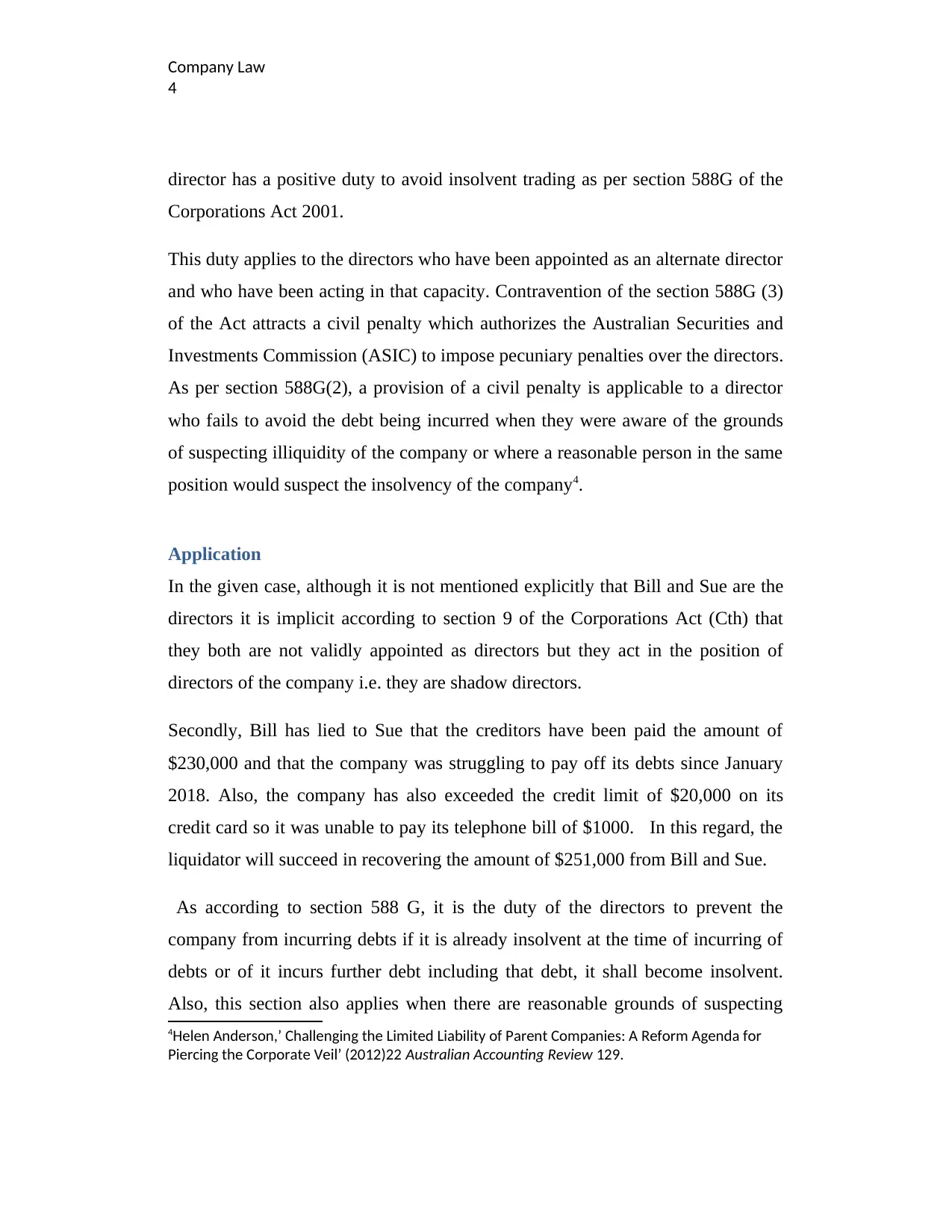
Company Law
4
director has a positive duty to avoid insolvent trading as per section 588G of the
Corporations Act 2001.
This duty applies to the directors who have been appointed as an alternate director
and who have been acting in that capacity. Contravention of the section 588G (3)
of the Act attracts a civil penalty which authorizes the Australian Securities and
Investments Commission (ASIC) to impose pecuniary penalties over the directors.
As per section 588G(2), a provision of a civil penalty is applicable to a director
who fails to avoid the debt being incurred when they were aware of the grounds
of suspecting illiquidity of the company or where a reasonable person in the same
position would suspect the insolvency of the company4.
Application
In the given case, although it is not mentioned explicitly that Bill and Sue are the
directors it is implicit according to section 9 of the Corporations Act (Cth) that
they both are not validly appointed as directors but they act in the position of
directors of the company i.e. they are shadow directors.
Secondly, Bill has lied to Sue that the creditors have been paid the amount of
$230,000 and that the company was struggling to pay off its debts since January
2018. Also, the company has also exceeded the credit limit of $20,000 on its
credit card so it was unable to pay its telephone bill of $1000. In this regard, the
liquidator will succeed in recovering the amount of $251,000 from Bill and Sue.
As according to section 588 G, it is the duty of the directors to prevent the
company from incurring debts if it is already insolvent at the time of incurring of
debts or of it incurs further debt including that debt, it shall become insolvent.
Also, this section also applies when there are reasonable grounds of suspecting
4Helen Anderson,’ Challenging the Limited Liability of Parent Companies: A Reform Agenda for
Piercing the Corporate Veil’ (2012)22 Australian Accounting Review 129.
4
director has a positive duty to avoid insolvent trading as per section 588G of the
Corporations Act 2001.
This duty applies to the directors who have been appointed as an alternate director
and who have been acting in that capacity. Contravention of the section 588G (3)
of the Act attracts a civil penalty which authorizes the Australian Securities and
Investments Commission (ASIC) to impose pecuniary penalties over the directors.
As per section 588G(2), a provision of a civil penalty is applicable to a director
who fails to avoid the debt being incurred when they were aware of the grounds
of suspecting illiquidity of the company or where a reasonable person in the same
position would suspect the insolvency of the company4.
Application
In the given case, although it is not mentioned explicitly that Bill and Sue are the
directors it is implicit according to section 9 of the Corporations Act (Cth) that
they both are not validly appointed as directors but they act in the position of
directors of the company i.e. they are shadow directors.
Secondly, Bill has lied to Sue that the creditors have been paid the amount of
$230,000 and that the company was struggling to pay off its debts since January
2018. Also, the company has also exceeded the credit limit of $20,000 on its
credit card so it was unable to pay its telephone bill of $1000. In this regard, the
liquidator will succeed in recovering the amount of $251,000 from Bill and Sue.
As according to section 588 G, it is the duty of the directors to prevent the
company from incurring debts if it is already insolvent at the time of incurring of
debts or of it incurs further debt including that debt, it shall become insolvent.
Also, this section also applies when there are reasonable grounds of suspecting
4Helen Anderson,’ Challenging the Limited Liability of Parent Companies: A Reform Agenda for
Piercing the Corporate Veil’ (2012)22 Australian Accounting Review 129.
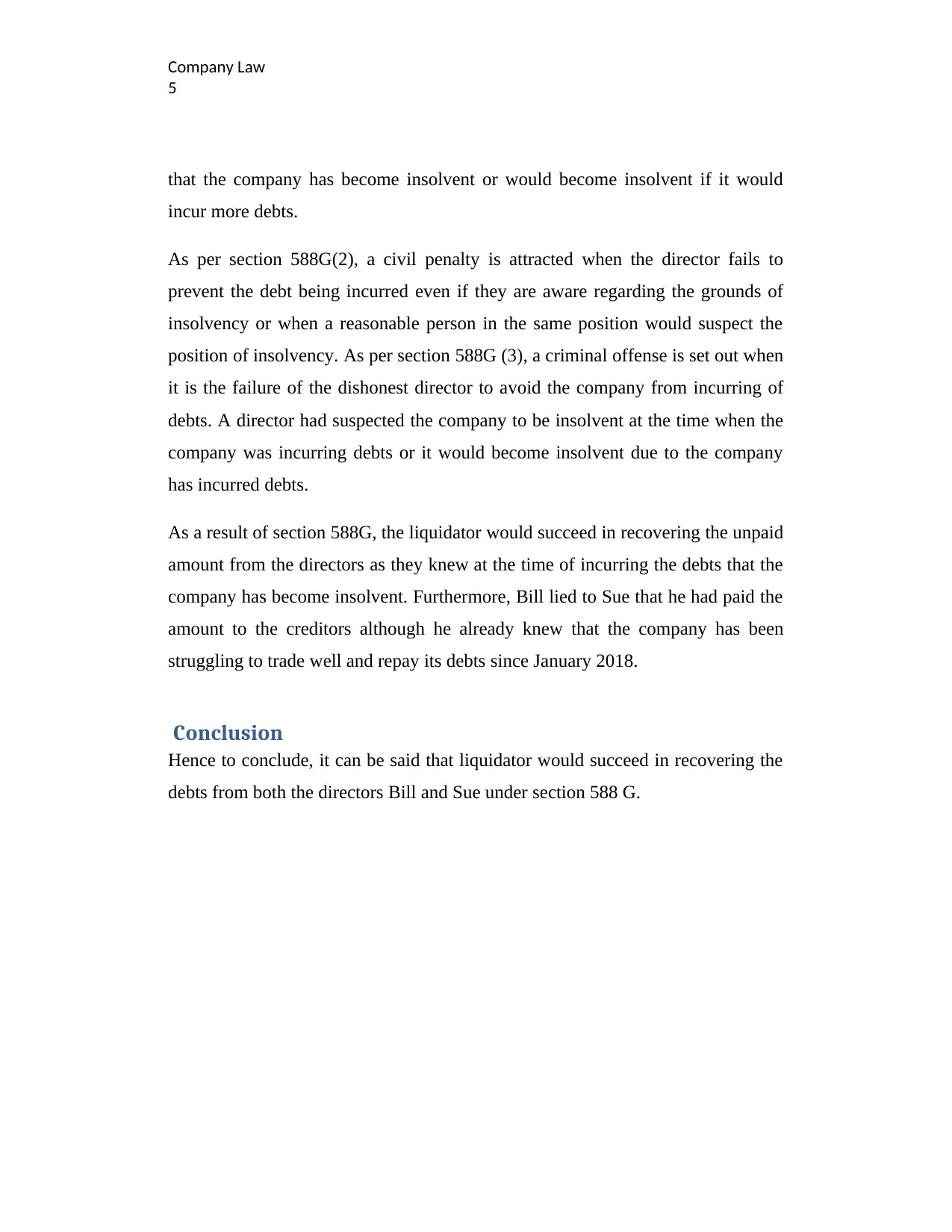
Company Law
5
that the company has become insolvent or would become insolvent if it would
incur more debts.
As per section 588G(2), a civil penalty is attracted when the director fails to
prevent the debt being incurred even if they are aware regarding the grounds of
insolvency or when a reasonable person in the same position would suspect the
position of insolvency. As per section 588G (3), a criminal offense is set out when
it is the failure of the dishonest director to avoid the company from incurring of
debts. A director had suspected the company to be insolvent at the time when the
company was incurring debts or it would become insolvent due to the company
has incurred debts.
As a result of section 588G, the liquidator would succeed in recovering the unpaid
amount from the directors as they knew at the time of incurring the debts that the
company has become insolvent. Furthermore, Bill lied to Sue that he had paid the
amount to the creditors although he already knew that the company has been
struggling to trade well and repay its debts since January 2018.
Conclusion
Hence to conclude, it can be said that liquidator would succeed in recovering the
debts from both the directors Bill and Sue under section 588 G.
5
that the company has become insolvent or would become insolvent if it would
incur more debts.
As per section 588G(2), a civil penalty is attracted when the director fails to
prevent the debt being incurred even if they are aware regarding the grounds of
insolvency or when a reasonable person in the same position would suspect the
position of insolvency. As per section 588G (3), a criminal offense is set out when
it is the failure of the dishonest director to avoid the company from incurring of
debts. A director had suspected the company to be insolvent at the time when the
company was incurring debts or it would become insolvent due to the company
has incurred debts.
As a result of section 588G, the liquidator would succeed in recovering the unpaid
amount from the directors as they knew at the time of incurring the debts that the
company has become insolvent. Furthermore, Bill lied to Sue that he had paid the
amount to the creditors although he already knew that the company has been
struggling to trade well and repay its debts since January 2018.
Conclusion
Hence to conclude, it can be said that liquidator would succeed in recovering the
debts from both the directors Bill and Sue under section 588 G.
⊘ This is a preview!⊘
Do you want full access?
Subscribe today to unlock all pages.

Trusted by 1+ million students worldwide
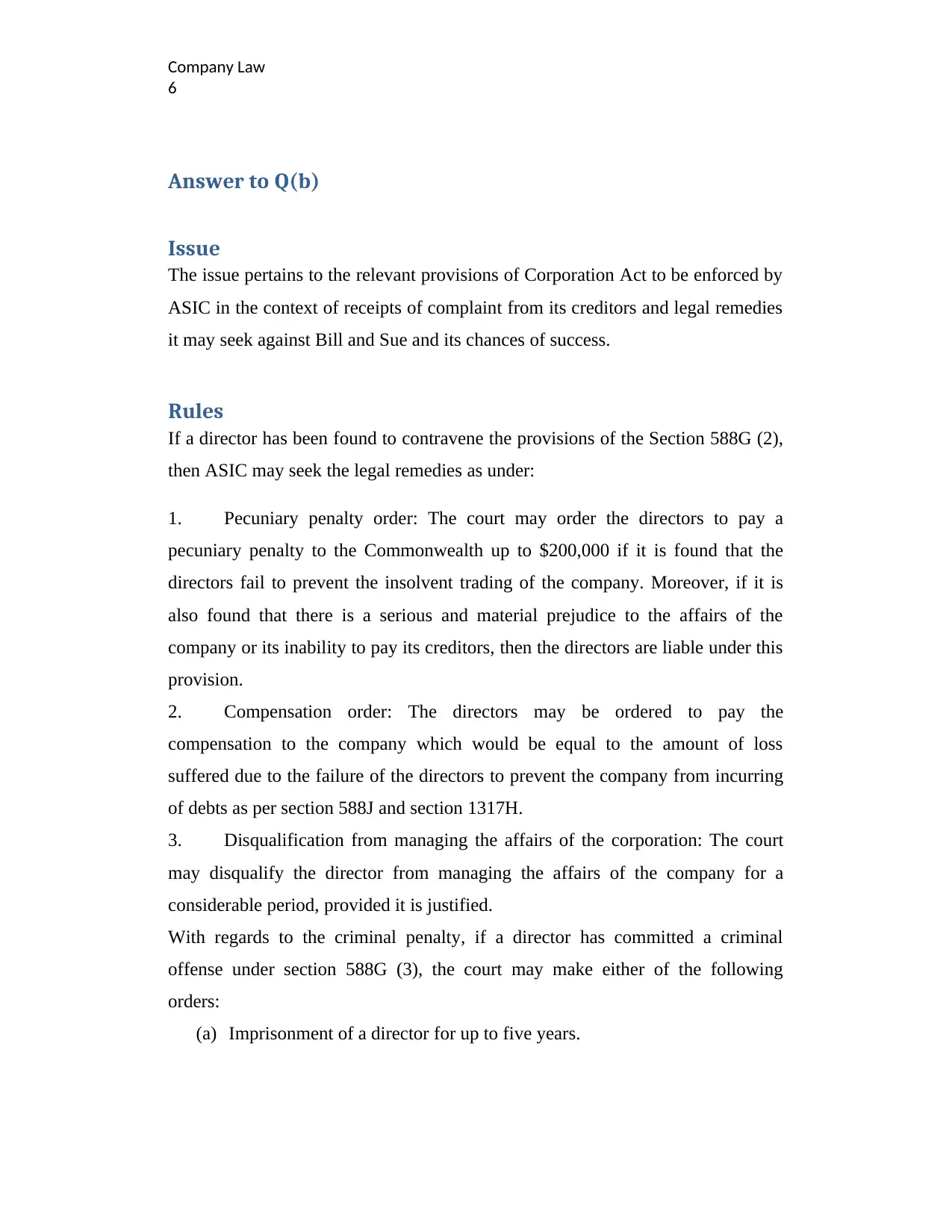
Company Law
6
Answer to Q(b)
Issue
The issue pertains to the relevant provisions of Corporation Act to be enforced by
ASIC in the context of receipts of complaint from its creditors and legal remedies
it may seek against Bill and Sue and its chances of success.
Rules
If a director has been found to contravene the provisions of the Section 588G (2),
then ASIC may seek the legal remedies as under:
1. Pecuniary penalty order: The court may order the directors to pay a
pecuniary penalty to the Commonwealth up to $200,000 if it is found that the
directors fail to prevent the insolvent trading of the company. Moreover, if it is
also found that there is a serious and material prejudice to the affairs of the
company or its inability to pay its creditors, then the directors are liable under this
provision.
2. Compensation order: The directors may be ordered to pay the
compensation to the company which would be equal to the amount of loss
suffered due to the failure of the directors to prevent the company from incurring
of debts as per section 588J and section 1317H.
3. Disqualification from managing the affairs of the corporation: The court
may disqualify the director from managing the affairs of the company for a
considerable period, provided it is justified.
With regards to the criminal penalty, if a director has committed a criminal
offense under section 588G (3), the court may make either of the following
orders:
(a) Imprisonment of a director for up to five years.
6
Answer to Q(b)
Issue
The issue pertains to the relevant provisions of Corporation Act to be enforced by
ASIC in the context of receipts of complaint from its creditors and legal remedies
it may seek against Bill and Sue and its chances of success.
Rules
If a director has been found to contravene the provisions of the Section 588G (2),
then ASIC may seek the legal remedies as under:
1. Pecuniary penalty order: The court may order the directors to pay a
pecuniary penalty to the Commonwealth up to $200,000 if it is found that the
directors fail to prevent the insolvent trading of the company. Moreover, if it is
also found that there is a serious and material prejudice to the affairs of the
company or its inability to pay its creditors, then the directors are liable under this
provision.
2. Compensation order: The directors may be ordered to pay the
compensation to the company which would be equal to the amount of loss
suffered due to the failure of the directors to prevent the company from incurring
of debts as per section 588J and section 1317H.
3. Disqualification from managing the affairs of the corporation: The court
may disqualify the director from managing the affairs of the company for a
considerable period, provided it is justified.
With regards to the criminal penalty, if a director has committed a criminal
offense under section 588G (3), the court may make either of the following
orders:
(a) Imprisonment of a director for up to five years.
Paraphrase This Document
Need a fresh take? Get an instant paraphrase of this document with our AI Paraphraser
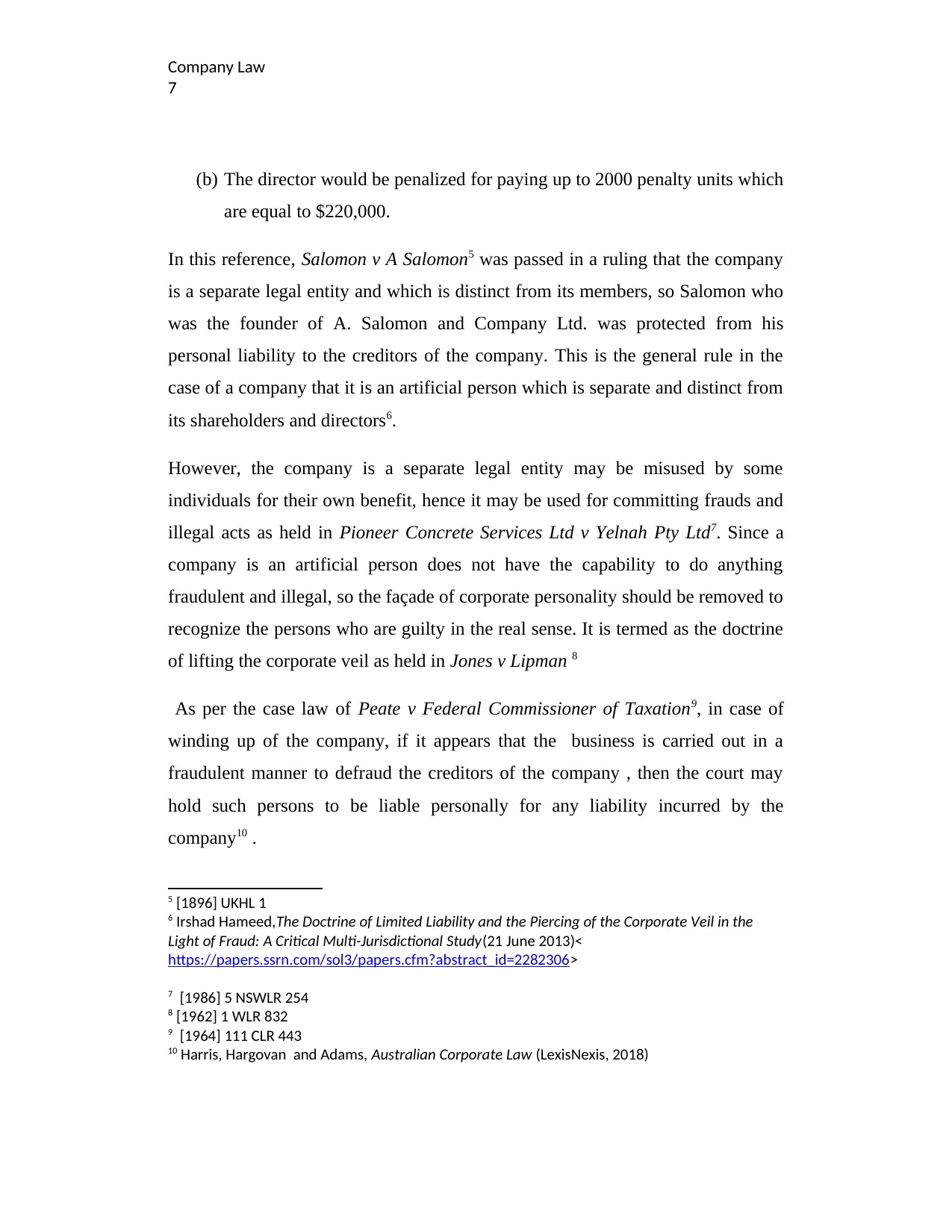
Company Law
7
(b) The director would be penalized for paying up to 2000 penalty units which
are equal to $220,000.
In this reference, Salomon v A Salomon5 was passed in a ruling that the company
is a separate legal entity and which is distinct from its members, so Salomon who
was the founder of A. Salomon and Company Ltd. was protected from his
personal liability to the creditors of the company. This is the general rule in the
case of a company that it is an artificial person which is separate and distinct from
its shareholders and directors6.
However, the company is a separate legal entity may be misused by some
individuals for their own benefit, hence it may be used for committing frauds and
illegal acts as held in Pioneer Concrete Services Ltd v Yelnah Pty Ltd7. Since a
company is an artificial person does not have the capability to do anything
fraudulent and illegal, so the façade of corporate personality should be removed to
recognize the persons who are guilty in the real sense. It is termed as the doctrine
of lifting the corporate veil as held in Jones v Lipman 8
As per the case law of Peate v Federal Commissioner of Taxation9, in case of
winding up of the company, if it appears that the business is carried out in a
fraudulent manner to defraud the creditors of the company , then the court may
hold such persons to be liable personally for any liability incurred by the
company10 .
5 [1896] UKHL 1
6 Irshad Hameed,The Doctrine of Limited Liability and the Piercing of the Corporate Veil in the
Light of Fraud: A Critical Multi-Jurisdictional Study(21 June 2013)<
https://papers.ssrn.com/sol3/papers.cfm?abstract_id=2282306>
7 [1986] 5 NSWLR 254
8 [1962] 1 WLR 832
9 [1964] 111 CLR 443
10 Harris, Hargovan and Adams, Australian Corporate Law (LexisNexis, 2018)
7
(b) The director would be penalized for paying up to 2000 penalty units which
are equal to $220,000.
In this reference, Salomon v A Salomon5 was passed in a ruling that the company
is a separate legal entity and which is distinct from its members, so Salomon who
was the founder of A. Salomon and Company Ltd. was protected from his
personal liability to the creditors of the company. This is the general rule in the
case of a company that it is an artificial person which is separate and distinct from
its shareholders and directors6.
However, the company is a separate legal entity may be misused by some
individuals for their own benefit, hence it may be used for committing frauds and
illegal acts as held in Pioneer Concrete Services Ltd v Yelnah Pty Ltd7. Since a
company is an artificial person does not have the capability to do anything
fraudulent and illegal, so the façade of corporate personality should be removed to
recognize the persons who are guilty in the real sense. It is termed as the doctrine
of lifting the corporate veil as held in Jones v Lipman 8
As per the case law of Peate v Federal Commissioner of Taxation9, in case of
winding up of the company, if it appears that the business is carried out in a
fraudulent manner to defraud the creditors of the company , then the court may
hold such persons to be liable personally for any liability incurred by the
company10 .
5 [1896] UKHL 1
6 Irshad Hameed,The Doctrine of Limited Liability and the Piercing of the Corporate Veil in the
Light of Fraud: A Critical Multi-Jurisdictional Study(21 June 2013)<
https://papers.ssrn.com/sol3/papers.cfm?abstract_id=2282306>
7 [1986] 5 NSWLR 254
8 [1962] 1 WLR 832
9 [1964] 111 CLR 443
10 Harris, Hargovan and Adams, Australian Corporate Law (LexisNexis, 2018)
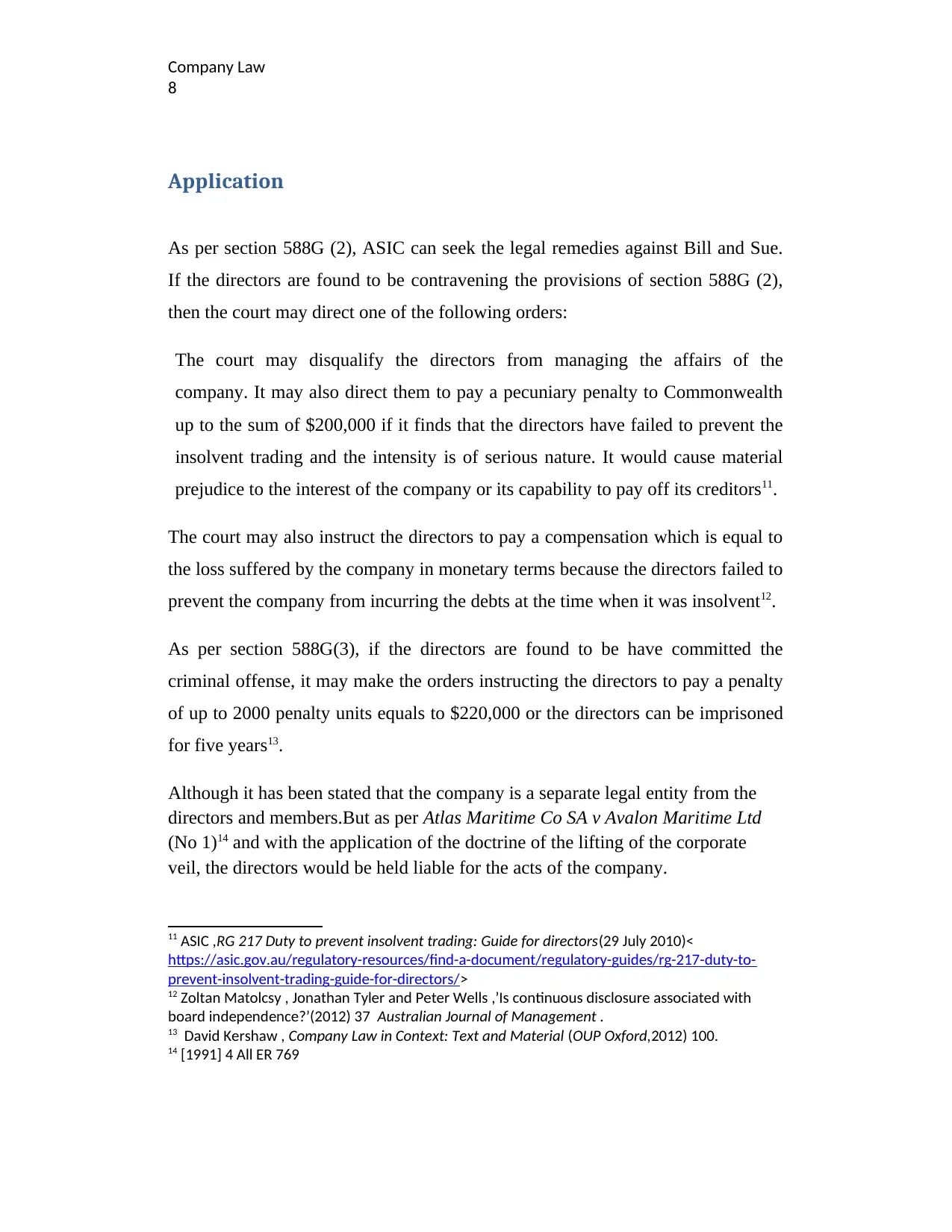
Company Law
8
Application
As per section 588G (2), ASIC can seek the legal remedies against Bill and Sue.
If the directors are found to be contravening the provisions of section 588G (2),
then the court may direct one of the following orders:
The court may disqualify the directors from managing the affairs of the
company. It may also direct them to pay a pecuniary penalty to Commonwealth
up to the sum of $200,000 if it finds that the directors have failed to prevent the
insolvent trading and the intensity is of serious nature. It would cause material
prejudice to the interest of the company or its capability to pay off its creditors11.
The court may also instruct the directors to pay a compensation which is equal to
the loss suffered by the company in monetary terms because the directors failed to
prevent the company from incurring the debts at the time when it was insolvent12.
As per section 588G(3), if the directors are found to be have committed the
criminal offense, it may make the orders instructing the directors to pay a penalty
of up to 2000 penalty units equals to $220,000 or the directors can be imprisoned
for five years13.
Although it has been stated that the company is a separate legal entity from the
directors and members.But as per Atlas Maritime Co SA v Avalon Maritime Ltd
(No 1)14 and with the application of the doctrine of the lifting of the corporate
veil, the directors would be held liable for the acts of the company.
11 ASIC ,RG 217 Duty to prevent insolvent trading: Guide for directors(29 July 2010)<
https://asic.gov.au/regulatory-resources/find-a-document/regulatory-guides/rg-217-duty-to-
prevent-insolvent-trading-guide-for-directors/>
12 Zoltan Matolcsy , Jonathan Tyler and Peter Wells ,’Is continuous disclosure associated with
board independence?’(2012) 37 Australian Journal of Management .
13 David Kershaw , Company Law in Context: Text and Material (OUP Oxford,2012) 100.
14 [1991] 4 All ER 769
8
Application
As per section 588G (2), ASIC can seek the legal remedies against Bill and Sue.
If the directors are found to be contravening the provisions of section 588G (2),
then the court may direct one of the following orders:
The court may disqualify the directors from managing the affairs of the
company. It may also direct them to pay a pecuniary penalty to Commonwealth
up to the sum of $200,000 if it finds that the directors have failed to prevent the
insolvent trading and the intensity is of serious nature. It would cause material
prejudice to the interest of the company or its capability to pay off its creditors11.
The court may also instruct the directors to pay a compensation which is equal to
the loss suffered by the company in monetary terms because the directors failed to
prevent the company from incurring the debts at the time when it was insolvent12.
As per section 588G(3), if the directors are found to be have committed the
criminal offense, it may make the orders instructing the directors to pay a penalty
of up to 2000 penalty units equals to $220,000 or the directors can be imprisoned
for five years13.
Although it has been stated that the company is a separate legal entity from the
directors and members.But as per Atlas Maritime Co SA v Avalon Maritime Ltd
(No 1)14 and with the application of the doctrine of the lifting of the corporate
veil, the directors would be held liable for the acts of the company.
11 ASIC ,RG 217 Duty to prevent insolvent trading: Guide for directors(29 July 2010)<
https://asic.gov.au/regulatory-resources/find-a-document/regulatory-guides/rg-217-duty-to-
prevent-insolvent-trading-guide-for-directors/>
12 Zoltan Matolcsy , Jonathan Tyler and Peter Wells ,’Is continuous disclosure associated with
board independence?’(2012) 37 Australian Journal of Management .
13 David Kershaw , Company Law in Context: Text and Material (OUP Oxford,2012) 100.
14 [1991] 4 All ER 769
⊘ This is a preview!⊘
Do you want full access?
Subscribe today to unlock all pages.

Trusted by 1+ million students worldwide

Company Law
9
Conclusion
ASIC would be successful in seeking the legal remedies according to section
588G (2) and section 588G (3).
9
Conclusion
ASIC would be successful in seeking the legal remedies according to section
588G (2) and section 588G (3).
Paraphrase This Document
Need a fresh take? Get an instant paraphrase of this document with our AI Paraphraser
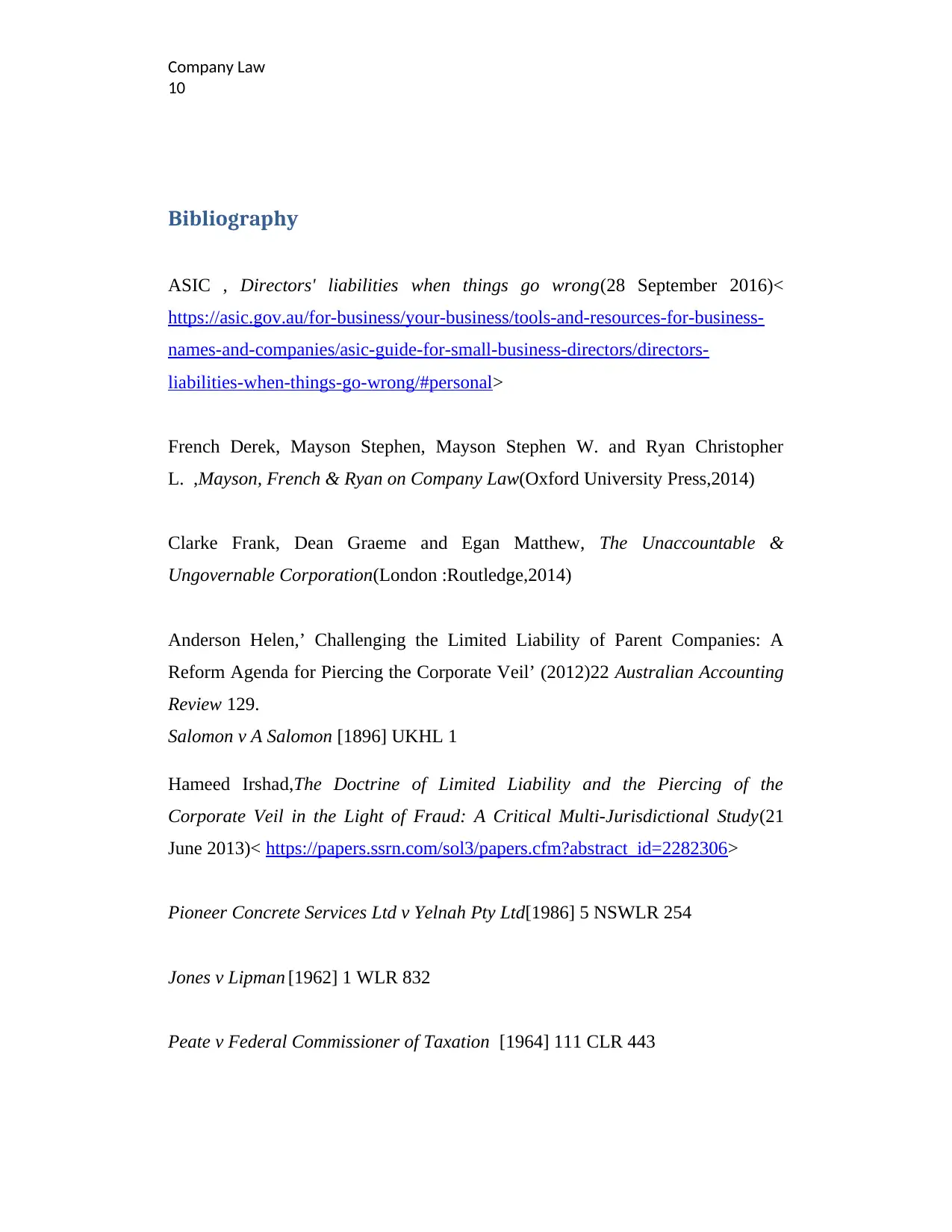
Company Law
10
Bibliography
ASIC , Directors' liabilities when things go wrong(28 September 2016)<
https://asic.gov.au/for-business/your-business/tools-and-resources-for-business-
names-and-companies/asic-guide-for-small-business-directors/directors-
liabilities-when-things-go-wrong/#personal>
French Derek, Mayson Stephen, Mayson Stephen W. and Ryan Christopher
L. ,Mayson, French & Ryan on Company Law(Oxford University Press,2014)
Clarke Frank, Dean Graeme and Egan Matthew, The Unaccountable &
Ungovernable Corporation(London :Routledge,2014)
Anderson Helen,’ Challenging the Limited Liability of Parent Companies: A
Reform Agenda for Piercing the Corporate Veil’ (2012)22 Australian Accounting
Review 129.
Salomon v A Salomon [1896] UKHL 1
Hameed Irshad,The Doctrine of Limited Liability and the Piercing of the
Corporate Veil in the Light of Fraud: A Critical Multi-Jurisdictional Study(21
June 2013)< https://papers.ssrn.com/sol3/papers.cfm?abstract_id=2282306>
Pioneer Concrete Services Ltd v Yelnah Pty Ltd[1986] 5 NSWLR 254
Jones v Lipman [1962] 1 WLR 832
Peate v Federal Commissioner of Taxation [1964] 111 CLR 443
10
Bibliography
ASIC , Directors' liabilities when things go wrong(28 September 2016)<
https://asic.gov.au/for-business/your-business/tools-and-resources-for-business-
names-and-companies/asic-guide-for-small-business-directors/directors-
liabilities-when-things-go-wrong/#personal>
French Derek, Mayson Stephen, Mayson Stephen W. and Ryan Christopher
L. ,Mayson, French & Ryan on Company Law(Oxford University Press,2014)
Clarke Frank, Dean Graeme and Egan Matthew, The Unaccountable &
Ungovernable Corporation(London :Routledge,2014)
Anderson Helen,’ Challenging the Limited Liability of Parent Companies: A
Reform Agenda for Piercing the Corporate Veil’ (2012)22 Australian Accounting
Review 129.
Salomon v A Salomon [1896] UKHL 1
Hameed Irshad,The Doctrine of Limited Liability and the Piercing of the
Corporate Veil in the Light of Fraud: A Critical Multi-Jurisdictional Study(21
June 2013)< https://papers.ssrn.com/sol3/papers.cfm?abstract_id=2282306>
Pioneer Concrete Services Ltd v Yelnah Pty Ltd[1986] 5 NSWLR 254
Jones v Lipman [1962] 1 WLR 832
Peate v Federal Commissioner of Taxation [1964] 111 CLR 443
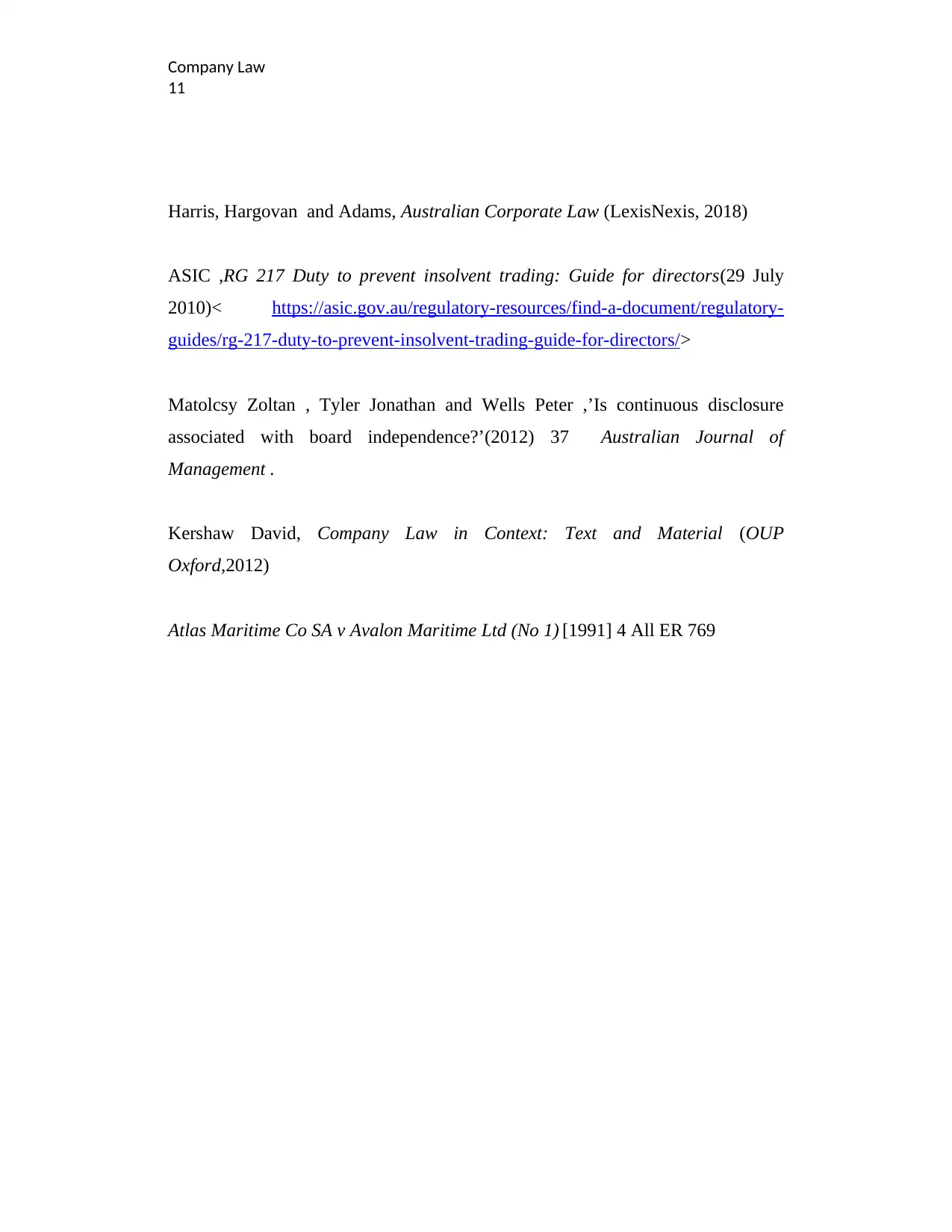
Company Law
11
Harris, Hargovan and Adams, Australian Corporate Law (LexisNexis, 2018)
ASIC ,RG 217 Duty to prevent insolvent trading: Guide for directors(29 July
2010)< https://asic.gov.au/regulatory-resources/find-a-document/regulatory-
guides/rg-217-duty-to-prevent-insolvent-trading-guide-for-directors/>
Matolcsy Zoltan , Tyler Jonathan and Wells Peter ,’Is continuous disclosure
associated with board independence?’(2012) 37 Australian Journal of
Management .
Kershaw David, Company Law in Context: Text and Material (OUP
Oxford,2012)
Atlas Maritime Co SA v Avalon Maritime Ltd (No 1) [1991] 4 All ER 769
11
Harris, Hargovan and Adams, Australian Corporate Law (LexisNexis, 2018)
ASIC ,RG 217 Duty to prevent insolvent trading: Guide for directors(29 July
2010)< https://asic.gov.au/regulatory-resources/find-a-document/regulatory-
guides/rg-217-duty-to-prevent-insolvent-trading-guide-for-directors/>
Matolcsy Zoltan , Tyler Jonathan and Wells Peter ,’Is continuous disclosure
associated with board independence?’(2012) 37 Australian Journal of
Management .
Kershaw David, Company Law in Context: Text and Material (OUP
Oxford,2012)
Atlas Maritime Co SA v Avalon Maritime Ltd (No 1) [1991] 4 All ER 769
⊘ This is a preview!⊘
Do you want full access?
Subscribe today to unlock all pages.

Trusted by 1+ million students worldwide
1 out of 12
Related Documents
Your All-in-One AI-Powered Toolkit for Academic Success.
+13062052269
info@desklib.com
Available 24*7 on WhatsApp / Email
![[object Object]](/_next/static/media/star-bottom.7253800d.svg)
Unlock your academic potential
Copyright © 2020–2026 A2Z Services. All Rights Reserved. Developed and managed by ZUCOL.





